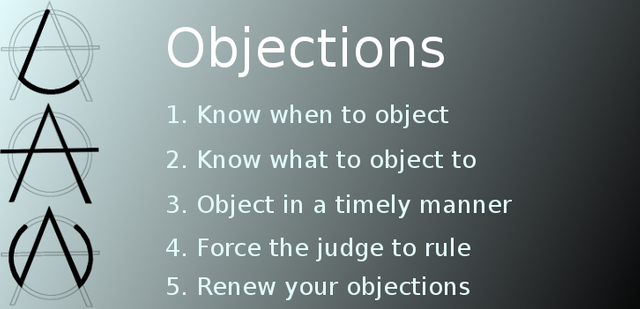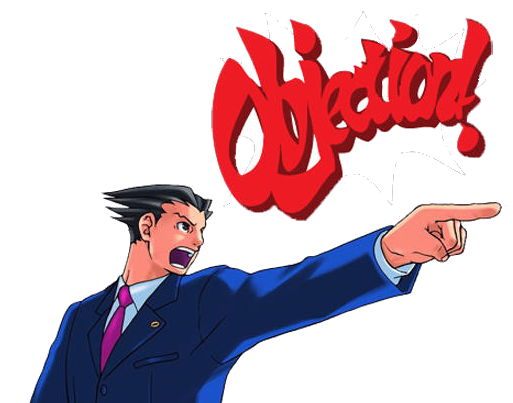Legal Self Defense - Objections
Maxim of Law: Qui tacet consentire videturHe who is silent, when he ought to have spoken and was able to do so, is taken to agree.
Objections are fundamental to the process of law.
If you...
- don't know when to object,
- don't know what to object to,
- or fail to object in a timely manner...
then you are assumed to be in agreement with what was said.
Even if you do object, your objection can be treated as never having happened if you don't know how to force your objection to be acknowledged on the record.

Raising objections - a key concept in accessing law.
Notices
- I am not a lawyer. I don't even have a law degree.
- This is not legal advice. It is my opinion formed from my own experiences and research. Do your own research.
When to object
The proper time to object to any statement (or action) made in court is as soon as you know that you should object.
Since it is your life, liberty, and/or assets on the line (and not your lawyers if you have one) it is very important that you pay close attention to what is being said in court and make timely objections when appropriate.
Also, be sure to pay attention to things being done improperly (setting trial dates before discovery is complete, unlawfully preventing discovery, attempting to rush you to judgment, trampling your rights, etc.) and object to them at once. Get your objections on the record!
This is doubly true for verbal statements made at trial because although your objection can be upheld, the jury will have already heard what was said if you wait too long to object.
Records can be amended but people cannot unhear what has been said no matter how many times a judge tells them to ignore what they have just heard.
What to object to
You should object when anyone violates the rules of evidence or procedure ( civil or criminal ).
You should also object to anything being done that seems unreasonable, unfair, or unlawful.
Common things to object to:
- Hearsay - people offering statements made outside of court by someone who is not there in order to prove the truth of something
- Lawyers Testifying - when a lawyer states facts outside of his knowledge (those learned from other people) that are not already on the record (you see this all the time in court tv shows)
- Facts not in evidence - Often, this is the same as a lawyer testifying, but can apply to anyone. If a lawyer is stating things as fact that are not in evidence already (e.g. someone testified to them, evidence was introduced onto the record, they were brought in during discovery or the pleadings, etc.) then you should object.
- Asked and answered - Use this objection when a lawyer is asking the same question over and over (even when phrased slightly differently)
- Not in the pleadings - The pleadings (Complaint, Answer, etc.) determine what the court case is about. They cannot change once done without court approval (e.g. motion to amend, etc.)... and should not be added to or changed during the course of the court process. Don't let people pull the case away from the issues at hand.
- Speculation - Guesses, beliefs, and other speculation is not allowed. Object!
- Relevance - If something is not relevant to your case, it should not be on the record.
There are many other objections, but the above are some of those that are easy to spot and often abused.
Other common objections relate to the following:
- Abuse of process - doing things that are not allowed by court procedure
- Rushing to judgment - moving to discovery before the pleadings are complete, trying to set court dates before discovery has been completed, or doing anything else that fails to give all involved parties time to make their case.
What if a Judge ignores your objection?
If a judge doesn't respond to your objection quickly (e.g. the one you are objecting to goes back to what they were saying) then move the court to have your objection ruled upon. I'll talk more on objections shortly as moving the court is another fundamental thing to comprehend where law is concerned.
This practically forces the judge to either sustain or overrule your objection as failing to do so will be seen as judicial error on appeal... and no judge wants to have their rulings overturned.
Fail to do move the judge to rule on your objection and it will be assumed that the judge didn't hear you and your objection will be ignored on appeal.
What if a Judge overrules your objection?
That is fine. You might be out of line or incorrect, it happens.
Even so, if you believe you are right to object be sure to renew your objection at the appropriate time (see the proper rules of procedure and/or evidence) so that it will be preserved in case you need to appeal to a higher court.
Don't take things lying down

Objections are fundamental to being involved in a lawsuit.
Even if you hire a lawyer (whether for legal advice or to represent you), keep in mind that the lawyer walks at the end of the day no matter what happens.
If you spend a couple of days (or even a few hours) learning about objections and practicing them you might well be able to raise proper objections that your lawyer misses.
There are at least a couple of games out there to help learn objections, but I haven't had the occasion to play them. If you have someone else that also wants to learn law it wouldn't be hard to practice by taking turns giving testimony and having your partner try to spot objectionable statements and raise them quickly.
This is part of my ongoing lawful self defense series ( see the introduction here or the overview on my site ), which I'm writing primarily because I believe that if more of us learned how to access the law we'd live in a better world.
Feel free to ask questions, provide insights, and/or follow me ( @tony.jennings ) if you want to see more articles like this.
these are never handled by objection, always by motion.
An objection is only for testimony and the in-court introduction of evidence not in discovery (almost always during testimony)
To clarify, I meant that one should object at hearings on motions for the types of actions you quoted.
Objections are for hearings as well as testimony and in court introduction of evidence.
If someone is opening their mouth and saying something they shouldn't be saying, you should be objecting.
Of course, if you are in federal court (or any other court without hearings) then you file a motion in opposition instead of objecting... but I haven't gotten to motions yet.
If you attend a hearing for a motion filed during discovery then you need to know how to object if you want to prevent garbage from getting into the record.
all of the above is incorrect.
Thats the problem with you and the other anarchist fake-lawyer posters here. You have no experience, no education, and an incomplete reading list that you only partially comprehend. And years of watching court on TV to give you a completely inaccurate picture of how it works.
The result is that you give the same kind of advice that an amatuer, inexperienced bomb maker or lion tamer might give -- dangerous partially accurate advice likely to do more harm than good for anyone applying it.
As a side note, i have no idea where you got the notion that there are no hearings in federal court. Of course there are. Motions and hearings aren't alternatives to one another. A hearing is where the lawyers make oral arguments supporting or opposing motions.
In any court, some motions are decided by the judge without a hearing based on the written arguments filed by counsel. Whether or not there is a hearing is the judges discretion. usually, if the decision involves an issue of fact, the judge is more likely to have a hearing. But some judges just like or don't like to hear oral argumentation.
During that hearing, there will be two types of information presented. The same two types of information presented through the rest of the trial:
Easy peasy, right.
The more I read about law, procedure, etc, the more I could see how screwed I was getting by own lawyer --forget about the rest of the shenannigans.
I want to see real change in the behaviors of lawyers that abuse loopholes to suck us much money out of their clients as possible.
I want to find good lawyers who uphold being transparent with their clients, who understand that legal terminology is not actual English, who will acknowledge a client's findings but take th the time to educate the client about why that particular court won't listen, etc...
Many of the answers I needed during one of my cases, I had to go find my own. My lawyer knew the answers, but refused to share them. Boy oh boy, though, did she charge me plenty for replying back to me letting me know why she felt she wasn't obligated to answer the #$*@^! questions.
I engaged a law student on the train one morning. A real hopeful young lad. He restored some faith in the fact that there are good lawyers out there looking to change the tides. Those are the ones I want to find and align myself with.
But if people knew just how much they were getting screwed, there would be an uproar.